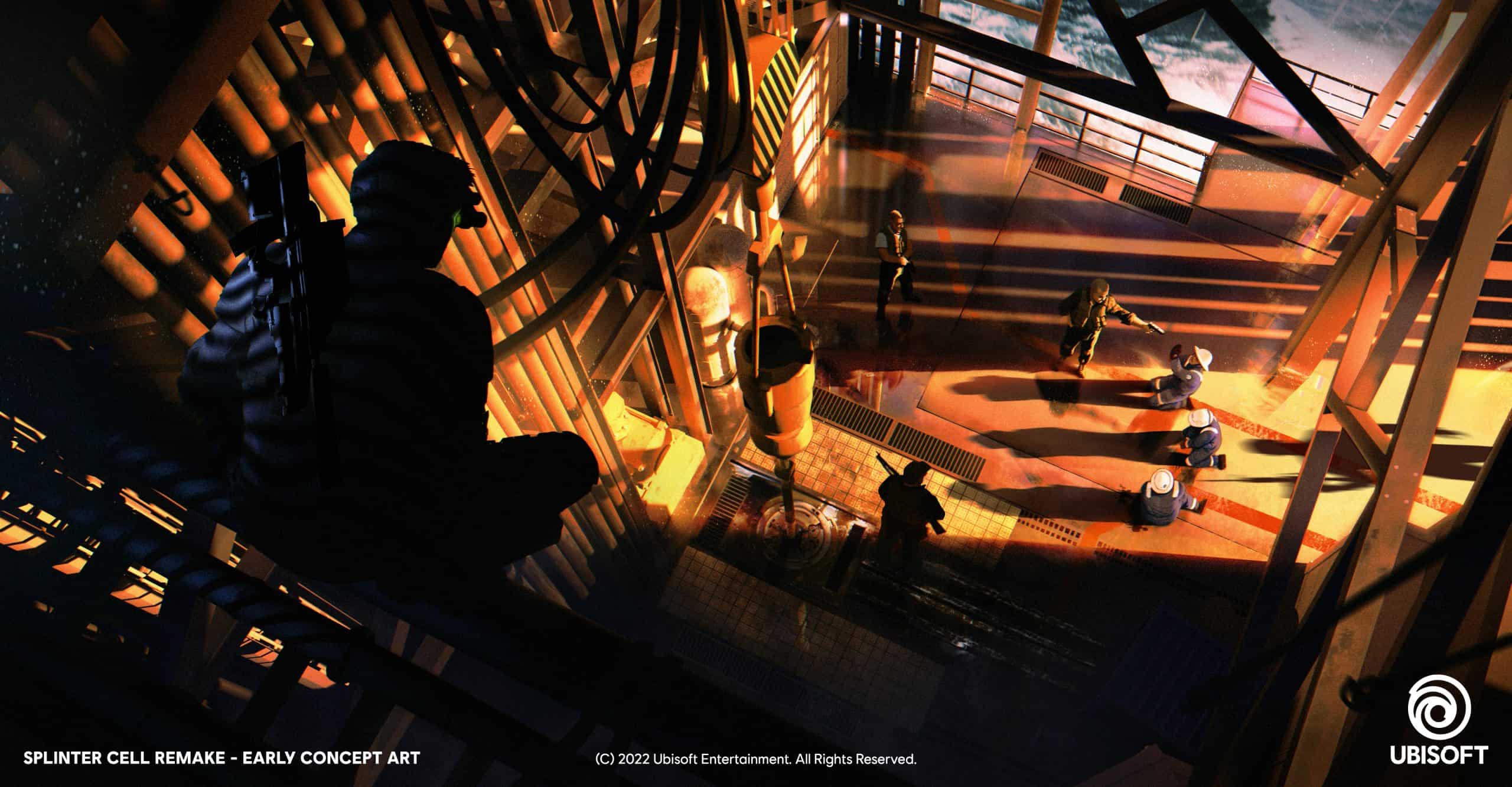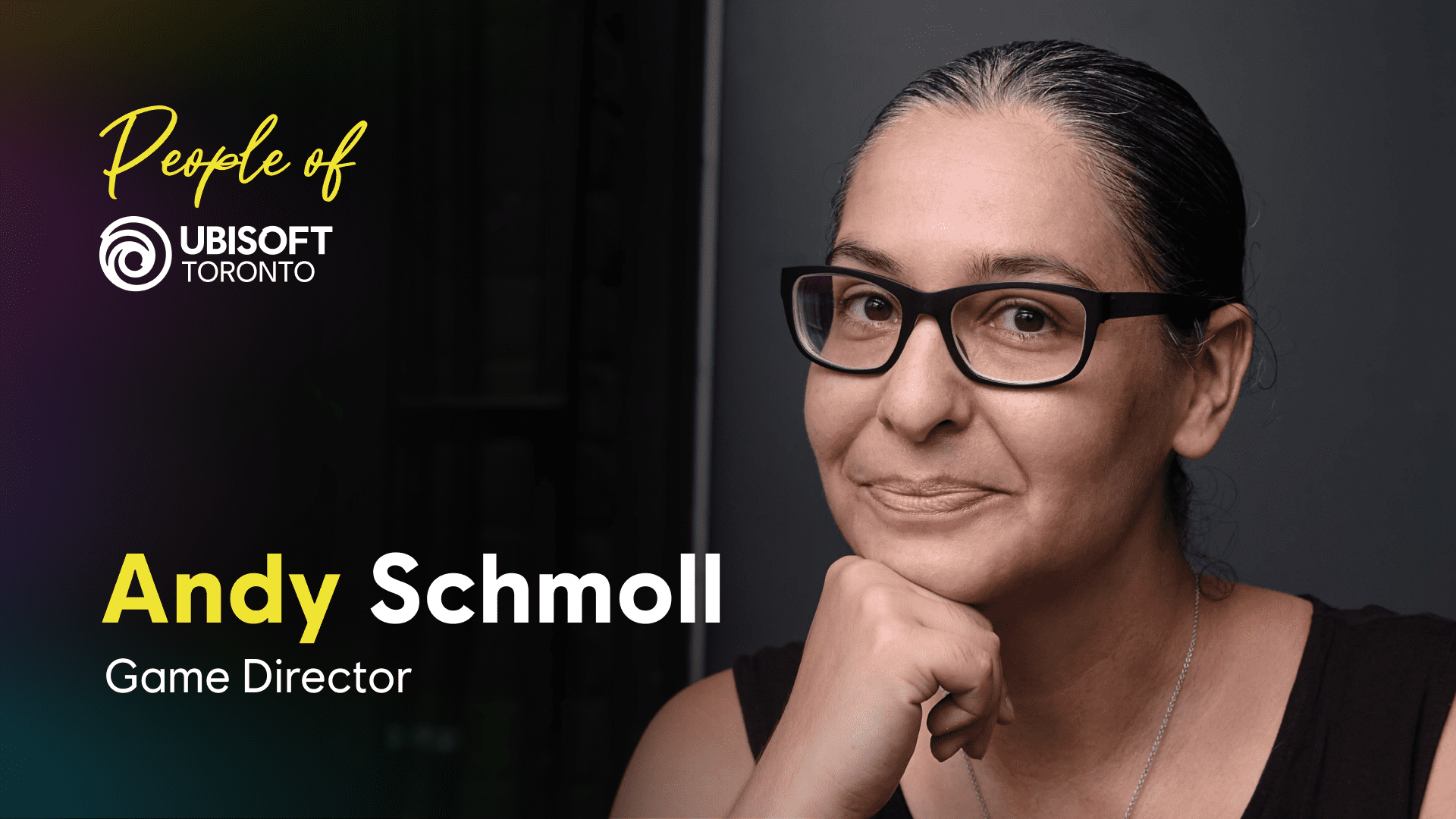An unexpected part-time gig kickstarted Andy’s 18-year journey in the video game industry. Today, as Game Director on the Splinter Cell remake, Andy plays an integral part on the team rebuilding the game from the ground up with passion and care. While their career path wasn’t always smooth, it has inspired them to work towards a more inclusive industry and pave the way for the next generation in gamedev through mentorship. Read on for their advice on being a great mentor and even a sneak peek into what they’re working on for the Splinter Cell remake!
What do you do as a Game Director? And what’s your favourite thing about your role?
As a Game Director, I look at the bigger picture, how every single aspect of the game comes together, and how it feels as a whole. I spend a lot of time in meetings these days, either reviewing the progress of the team, giving feedback and providing direction when necessary, or figuring out ways to ensure the team can work on the game with as little friction as possible.
Over my career, I have had several titles and various positions and duties. Prior to becoming Game Director, I was a game designer and spent a lot of my time in the editor, testing, reviewing, and tuning my features, and seeing how they interact with other systems in the game.
Now, my focus has shifted to playing the game and reviewing every aspect of it, ensuring that the gameplay feels great, makes sense, and offers players a cohesive experience. My favorite thing about being a game director is finding ways to enable the team to take ownership over their work and collaborating with them in the creation of a game and the process that entails.
What drew you to Ubisoft Toronto?
I joined Ubisoft in February 2017, then left in January 2021, and returned a year later to work on the Splinter Cell remake. What first drew me to Ubisoft was its open world games that allowed the players to immerse themselves into a complex world with engaging stories and narratives that make for stellar experiences. I had worked on smaller projects and more linear games before. Working on open world games allowed me to grow my skill set, while working on exciting franchises, such as Far Cry 6 and now Splinter Cell.
Beyond that what drew me back to Ubisoft Toronto were the people on the project. When I learned about the team, I recognized a lot of names of people I loved working with, and who brought the right mindset and cared equally about the people on the team as well as remaking Splinter Cell.
CAREER DEVELOPMENT
What did you do before working at Ubisoft Toronto? How did you break into the video game industry?
I’ve been making games since 2005. My break into the industry was mostly accidental – I was still a student at the University of Vienna and was looking for a part-time job when I came across a job posting from Rockstar Vienna. They were looking for a Usability Test Engineer, and I decided to apply for the position, despite having had no earlier experience in this field. I grew up with video games, but never thought it’d be a viable career, especially where I grew up. The games industry existed elsewhere. I figured I had nothing to lose, so I decided to give it a try, and sent in my resume. To my surprise, they invited me in for an interview. The interview went well, I was offered the job, and that was my introduction to game development.
From there, my path took me in so many different directions: indie games, online games, MMOs, Facebook games, stealth sim, serious games, etc. Being part of smaller teams allowed me to wear many different hats and explore the different areas of game design; this allowed me to figure out which aspects of game design I am most interested in and what to focus on during my career.
What are some tips you’d give to someone hoping to land a similar role to yours? OR What steps did you take to reach your current position?
It’s important to be curious, to observe, analyze, and learn. Systems can be found anywhere, and being able to see them, break them down, and understand how they fit into other existing systems is a great skill to have.
Additionally, it’s important to be willing to try out and learn new things, especially through mistakes we make along the way. Each iteration of a design teaches us something new – about what is working well, but also, what isn’t. Not being afraid to make mistakes but embracing them and using them to improve our work is such a crucial part of being a systems designer.
It’s also important to work well within a team, to be approachable, and to care about your team member’s well-being, so you all can reach that end goal together
CURRENT PROJECTS

What about the Splinter Cell remake has you fired up?
I am a huge fan of stealth games and being able to work on one of the most memorable stealth games is huge! I am excited that the team that is working on this game is also one of the best ones imaginable for a remake of this kind – we all share the same amount of excitement and love for the original, which will be visible in the final product.
Any special memories from playing the previous Splinter Cell games? What do you think makes the franchise so unique?
Splinter Cell impressed me by having dynamic lighting that was innovative at the time. The player was able to interact with light sources to create their own shadows (or lit areas), but what was even more impressive is that the player could try and shoot light bulbs. When the bullet grazed them but didn’t break them, they started swinging, which created dynamic shadows.
STUDIO CULTURE
What surprised you most when you joined Ubisoft Toronto?
I remember I was impressed by how diverse and how inclusive the studio was! I had never experienced something like this before. I was also blown away by the different ambassador and mentorship programs they have in place from Indie Series and Develop at Ubisoft to NEXT and Hack the ROM, which are all helping to make a positive impact on the industry and in the community.
MENTORSHIP
You’ve been an active mentor in several of the programs you’ve mentioned such as Hack the ROM and Indie Series. Tell us a little more about what you do as a mentor and why it’s important to you.
As a mentor, I try to support younger developers and students who are transitioning from school into work life or are interested in pursuing a career in game development. It’s important to provide new opportunities and create entry points for younger developers, and remove some of the obstacles that they’re facing, especially at the very beginning of their careers.
What I do heavily depends on my mentees’ needs – I start by listening to who they are, and where they are in their career, and together we figure out what it is they need the most. They may need help with a job application, or are stuck on a project, and can’t figure out where they should take their career. Each mentee has their own individual needs, and those define the next steps.
In an age where info is readily available on the Internet, why is mentorship so important?
Mentorship is not one size fits all. Mentoring means working with a person, getting to know them, understanding where their strengths lie, and where they need more support. A mentor’s support caters to their mentee’s needs, and takes their circumstances, personality, and more into account.
Despite the wealth of information that is readily available on the internet, it is sometimes difficult to find the right sources, or know what to look out for. A mentor can recommend reading material, talks, and papers, and can point their mentees in the right direction. More importantly, though, they can make recommendations that take the unique needs and circumstances of their mentees into consideration.
It’s clear how mentees can benefit from a mentorship but are there benefits for mentors too?
We never stop learning, and a great way to learn and improve our skills is to become a mentor. Mentorship allows us to grow as people, to learn about other people’s realities and their individual obstacles. It broadens our own horizons and teaches us to become more empathetic.
A lot of the skills that are required for mentorship are also skills that make great managers and leaders. Anyone who is interested in moving into those roles greatly benefits from becoming a mentor – being able to practice how to actively listen, how to prepare actionable feedback, and identifying strengths and setting improvement goals are all skills that a manager uses daily.
You recently presented how great mentors can grow into even stronger leaders at the 2023 Game Developers Conference (GDC). What does it mean to you to have a large platform like GDC?
I am hoping to inspire others who may have been interested in becoming a mentor but were unsure how to take the next step, and maybe even get the stone rolling in creating mentorship programs at their studios.
Get the full recap on Andy’s GDC talk here!
PERSONAL
What do you do to relax?
I love everything horror! As ironic as it may sound, I enjoy watching horror movies or playing horror games to relax.
Can you share your experience as a nonbinary Game Designer in the video game industry?
Throughout my career, there’s always been harassment that I’ve experienced based on my gender. Mostly from gamers, but occasionally also from game developers. When I’ve experienced harassment, my manager and the studio took swift action to ensure my safety and well-being. They took care in creating a safe and inclusive space for myself and our teams. I also appreciate that folks at the studio are considerate about my pronouns (they/them).
Why is gender equity important at a studio and an industry level?
Gender equity touches on so many different aspects – the wage gap, gender biases, the glass ceiling that many face in their careers… Each of these aspects makes it harder for women and non-binary members to stay in the industry, have their voices heard, and to have a successful career. My hope is for more studios in the games industry to actively work on creating positive work environments and honestly care about their teams.
People of Ubisoft Toronto is a series featuring studio members from a variety of projects and backgrounds as they share their experiences at our studio, perspective of the video game industry and, perhaps, even a sneak peek of what they’re working on!
Our studio values diversity and believes in embracing differences to build stronger and more creative teams. We welcome people who would like to join us and redefine the future of games. Visit our careers page for more information on open roles and how to apply. To know more about our studio members and culture, click here.

